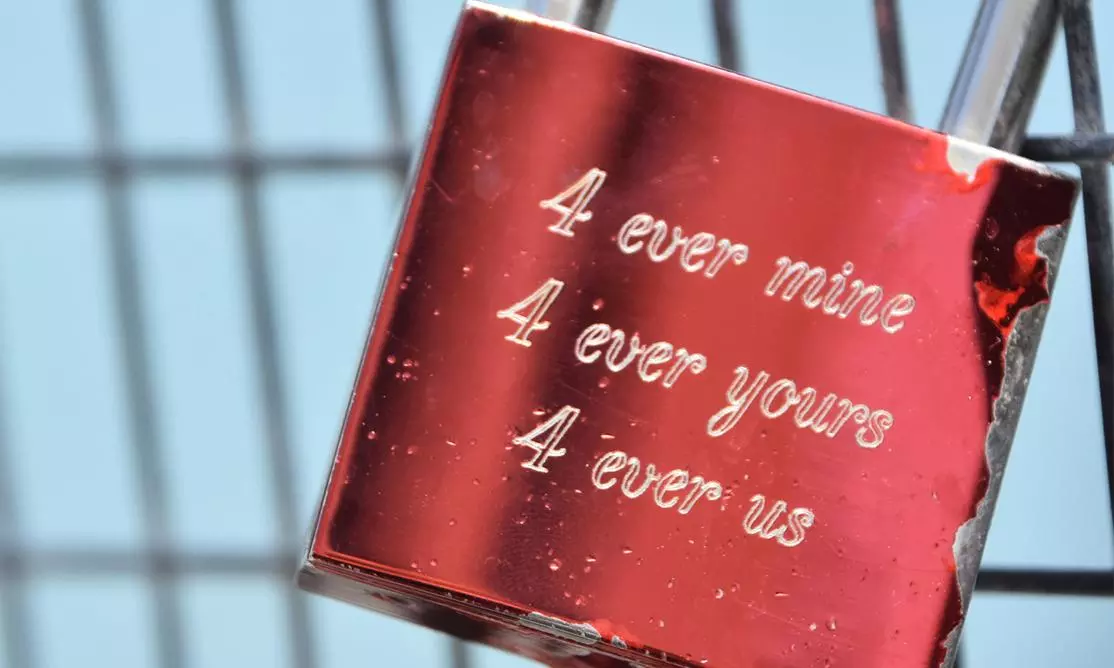
Top 10 quaint Valentine's Day traditions from around the world
From carving intricate wooden spoons to picking spring flowers for loved ones, couples celebrate Feb 14 in different ways; pick up a clue or two!

There are several charming and unusual traditions in which people express their romantic love for one another. From carving intricate wooden spoons to picking spring flowers for their loved ones, couples celebrate being in love in different ways on February 14, Valentine’s Day.
Here are some quaint romantic traditions around the world:
Italy
Italian sweethearts profess true love for each other by locking a padlock on famous bridges in Rome, Florence and Venice and then throwing the key away, typically into the water under the bridge. It’s not only done on Valentine’s day but anytime in the year. But the Italian authorities are cracking down on this ancient romantic custom since it destroys the historical beauty of old bridges and can harm the structure.
Meanwhile, in Verona, people flock to Casa di Giulietta ( fictional home of Juliet) to attach love letters on the building’s walls – and there are contests for the best written letter to Juliet.
Romania
Picking colourful flowers or washing one’s faces in snow for good luck is how couples in Romania celebrate Valentine’s Day. They also have a special day for lovers on February 24 when Romania traditionally observes Dragonbete (guardian of love) Day. The couples go into the woods to pick snowdrops or other early spring plants for the person they are courting and the girls allow the boys they love to kiss them.
Denmark
Denmark has a unqiue tradition where admirers send gaekkebrev (loosely translated as joke letters) to whoever they like. They are generally original poems or rhymes, written on paper and then decorated with designs pasted on them. These letters are however tricky because the men don’t sign their name at the end – instead, they use dots, with one dot to represent each letter of his name.
According to tradition, if the woman receiving the card correctly guesses the identity of the man who sent her the letter, that man has to give her an Easter egg that same year. Danes also send spring flowers, known as snowdrops to express their affection to the one they love. The snowdrop symbolises purity and hope for spring. This tradition dates back to the 18th century.
Fiji
In Fiji, nothing symbolises love more than offering a tabua or whale tooth to the object of your affection. It’s believed that when the tooth has been polished, it becomes incredibly powerful, so anyone who receives a tabua should feel blessed
France
The first ever Valentine’s Day card, it is believed, originated in France when Charles, the Duke of Orleans, sent his wife love letters during his imprisonment inside the Tower of London in 1415. The tradition of giving loved ones handwritten cards is alive and kicking even today, in the country that made love special centuries later.
It became commonplace to celebrate Valentine’s Day by giving your loved one a card. And, let's not forget the French village called “Valentine” turns into the epicenter of romance between 12th and 14th February.
Iceland
Love burns bright with the exchange of books in this Nordic country. In an enchanting fashion, couples exchange books on Valentine's Day, a tradition called "Bókabrúð" (Book Flood). This in a way emphasises the importance of literacy and storytelling in Icelandic culture.
China
In China, the Qixi Festival, celebrated on the seventh day of the seventh lunar month, is a traditional Chinese Valentine's Day replete with romantic legends and stargazing traditions.
South Africa
Women tend to literally wear their hearts on their sleeves on this day. Women pin the names of their crush or love interest on their shirt sleeves, which is an ancient Roman tradition known as Lupercalia. In many cases, this is how men learn who their secret admirers are.
Japan
On Valentine’s Day, women in Japan are doing most of the wooing and shopping. They purchase heart-shaped chocolates to express kokuhaku, or confess their feelings, for the men they love. A month later, on March 14—or White Day, the men reciprocate by giving gifts to the women who treated them back in February.
Wales
Welsh men show their love by carving intricate and unique designs into wooden spoons as a token of affection for the women they love. It is an old tradition which is followed around the end of January. Today, these love spoons are still exchanged for special celebrations such as proposals, weddings, and anniversaries.

